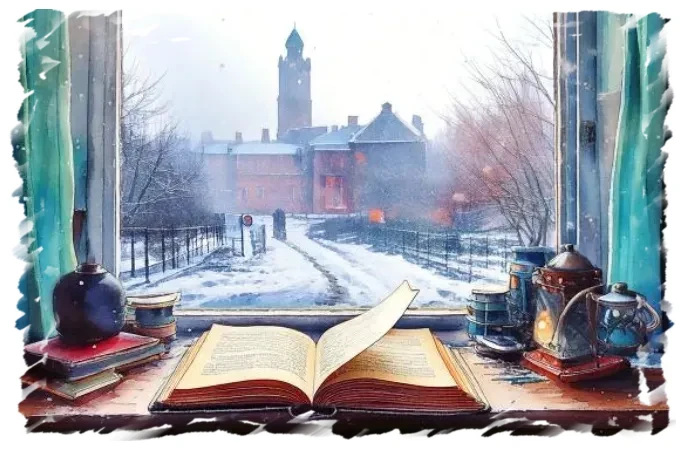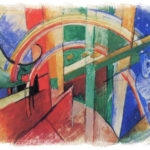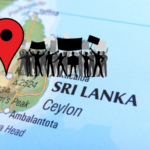I sank into the worn chair, drained from hours of lecturing. The soft rustle of papers beneath my fingers seemed amplified in the stillness of my small flat. Sometimes, I regret choosing this profession. But that was until I had a chance to talk with one of my brightest students, a bookworm in her final year. Her words cut through my doubts.
“Professor, if you hadn’t chosen this path, we would have regretted sitting somewhere else.” Her sentiment struck a chord, rekindling my passion for lecturing. It reminded me why I started teaching in the first place – to inspire and be inspired. I felt alive, blessed, and filled with a joy I hadn’t realised I’d been missing. In the hollow of my exhaustion, memories stirred like embers. My gaze returned to the faded photograph on the table, its frayed edges whispering of another time. As I gazed deeper, the present seemed to blur, and I felt myself being pulled into a different time, a different place – one where you were beside me.
The sound of gunfire was sharp, a violent reminder of the chaos outside. I crouched below the windowsill, my heart racing as I listened to the screams. Slowly, I stood and peered over the sill, scanning the chaos for a familiar face. Then, I saw him — his eyes locked on mine, his face set in a determined expression. “Stephen!” I cried, rushing toward him. But the scene dissolved into thin air, leaving only the quiet of my apartment behind. I shook myself back into the present, gathering my thoughts as I prepared for the next day’s lectures.
I still remember the first day I arrived in Dublin. The city’s energy felt alive, vibrant with the potential of something new. It was a rainy morning, and I rushed to catch the train. As I settled into the worn velvet seat, I met a woman who looked at me with curiosity.
“You’re not from here, are you?” she asked. “No,” I answered, adjusting my bag. “I’m Rayne, a newly appointed professor at Trinity College.” We exchanged pleasantries, and soon after, I met Emily—my first colleague in Dublin. We became quick friends, bonded by our love of literature. Her rosy cheeks and curly hair reminded me of the Petrarchan sonnets. This is how Sidney must have described his Stella. “Fáinne geal an lae,” said Emily as we walked through the city. On our way, she turned to me and asked, “What’s the meaning of your name, Rayne?” “It means ‘council’ or ‘helpful friend.’ And, fun fact, it’s a gender-neutral name!” I chuckled. “But what’s really cool is that it has Scandinavian origins, with connections to French, Yiddish, and Latin too. The name inherits the soothing essence of rain, embodying both its nourishing power and the comforting melody of raindrops on a rooftop,” I replied. Emily’s eyes widened in surprise. “Woah, that’s so interesting. So, whenever it rains here in Dublin, it will remind me of you!” She chuckled, and we both laughed together.
The laughter seemed so distant now, swallowed by the sounds of war and loss. As the misty Dublin evening drew to a close, Emily and I parted ways, promising to meet again soon. The gas lamps flickered, casting golden glows on the cobblestone streets, and the nearby river’s gentle lapping echoed through the fog. Emily had a fiancé, Thomas – a talented artist and a young soldier recently appointed to the Irish military. I had the opportunity to visit his gallery exhibition, where I was so touched by his paintings, which blended both East and West. Just like during the Crusades, which bridged the gap between Eastern and Western cultures, they diffused. I bought one. I complimented him on his work, finding it full of beauty and conviction. “Your art,” I told him, “has the spirit of the Pre-Raphaelites.” He wiped his eyes, overcome by my praise.
But the world around us was changing, war casting its shadow over the city. The Irish Civil War, born from the conflict over the Anglo-Irish Treaty, had forced our college to close. The conflict was tearing the country apart, claiming countless lives. Yet, I held onto the hope that life would somehow return to normal.
Then, one morning, Emily stumbled into my room, her face contorted in grief. She clutched a crumpled letter in her hand, and her eyes were red from crying. I rose from my chair, and she collapsed into my arms, sobbing uncontrollably.
“What happened?” I asked.
She handed me the letter, and I scanned it quickly. The words blurred together, but the message was clear: Thomas had been killed in action. I felt a wave of sorrow wash over me. I held Emily at arm’s length, looking into her tear-stained face.
“We’ll get through this together,” I promised. Soon after, I began to hear the explosions more clearly. The distant sounds of gunfire had turned into daily events, constant reminders of a world falling apart. Dublin was no longer a city of hope. It had become a battleground.
I was jolted awake the following day by a sound that reminded me of explosions, but it was only Sophie’s clock ticking away the minutes. I glanced at the time—7 a.m. Sophie would be late for school. With papers in my hand and memories in my mind, I stood at the bus stop with her. I adjusted her hat for what felt like the hundredth time. She boarded the bus, waving me goodbye.
As I waved back, a memory flashed before my eyes—our first meeting with Stephen at the café. Emily and I sat at a small table, chatting, when Stephen burst in, a newspaper in hand, and plopped down beside Emily. “Hey,” he said, tapping her hat from behind. “Hi, Stephen.” Emily smiled, adjusting it. I glanced up from the pages of my book, and my eyes met Stephen’s. “Ahh, escaping reality, I see,” he said, a sly smirk spreading across his face. He turned back to Emily, his expression turning serious. “You been following the news? The atmosphere in this country is getting intense.” Emily nodded. “I know, it’s like everyone’s on edge. Irish politics is on everyone’s lips.” Stephen shook his head. “I blame the left wing. They’re always stirring up trouble.” I raised an eyebrow. “You really think it’s that simple? Both sides have valid points.” Stephen snorted. “Valid points? Come on, you can’t seriously think the right wing is wrong on everything.” “I’m just saying we should consider multiple perspectives,” I shrugged. “That’s exactly what’s wrong with this country. Nobody’s willing to take a stand,” Stephen said,
stirring his coffee absentmindedly. I stood up, my voice rising. “But it’s the poor who always pay the price. They’re the ones who go to the front lines, forced to fight while the rich and powerful sit comfortably, unaffected by the carnage.” Stephen’s expression softened. “I’m not saying the poor don’t suffer. But there are bigger forces at play here—forces we can’t always control. If we don’t fight, if we don’t defend ourselves, then the world will fall apart.”
“That’s easy for you to say!” I shouted, the tears threatening to spill. “You’ll never know what it’s like
to have your life turned upside down for someone else’s ideology! And what it’s like to have your
loved ones sent off to fight, knowing they might not come back.”
“I don’t wish to trivialize your pain,” he said, “but you’re viewing this through a lens of emotion, not
reason.”
“How can you say that?” I responded sharply. “You speak of war as though it’s some detached thing.
But it’s real. It’s people, families, lives destroyed. And for what? For what reason is it ever justified?”
Stephen’s voice remained firm. “War is not something we can simply wish away. People will always
fight for what they believe in. You can’t deny that.”
Our first conversation was anything but ordinary. He was discussing the ongoing war, how the world
seemed to be on the edge of chaos, and yet, in his eyes, it was a necessary evil. We argued for hours, our words colliding like the storm outside. The argument ended unresolved, with no answers, just the bitter taste of disagreement.
But I couldn’t shake the feeling that something was about to change—something far darker than either of us could have imagined. It was 1922, and Ireland was ablaze with civil war. The Anglo-Irish Treaty, signed just a year ago, had sparked a bitter divide between those who supported the new Irish Free State and those who opposed it. Stephen—once a stranger—became part
of my life. Our debates about the war stretched late into the night. But, dear readers, this was only the
beginning of a never-ending saga.
Years later…
“It’s time for bed, Sophie!” I called out.
“Please, tell me a story!” Sophie begged, her voice barely above a whisper.
“Alright, let’s hear about the Children of Lir.” I smiled. “Long ago, in a land far, far away, there lived
four beautiful children—Fionnuala, Aodh, Fiachra, and Conn…” As I spoke, I gently waved Sophie’s hair, watching the snow fall outside. The scene reminded me of the last time I saw Stephen. It was a
snowy evening in Dublin when I saw him distributing food and blankets to those in need. He caught
my eye and walked over, exchanging warm smiles with Sophie.
“Hi there, Sophie! How are you today?” Stephen asked, his tone gentle.
Sophie smiled shyly, and I couldn’t help but feel surprised at Stephen’s kindness.
I turned to Stephen, curiosity getting the better of me. “When did this epiphany occur?” I asked, nodding toward the people he was helping. Stephen looked down, a small smile playing on his lips. He looked up at me, his eyes crinkling at the corners. “People are not as bad as you think, Rayne,” he replied, his voice soft.
I quickly changed the subject, sensing I was seeing his vulnerable side for the first time. “I walked into the bakery, intent on picking up something for us. But as I scanned the shelves, I was shocked to
find that every item had become exorbitantly expensive overnight.” He nodded as if he already knew
this would happen. Stephen mentioned he’d be leaving for the South soon. “The people there need me,” he explained. “I have to support the politicians in suppressing the rebels.” I felt my fury rise. “You support this senseless war?” I asked, my eyes blazing with conviction. “I believe in our country’s mission.” Stephen’s voice was steady. “Blind patriotism. You’re not seeing the bigger picture. War only breeds suffering,” I retorted.
“You are compromising justice!” His eyes narrowed.
“And you’re disregarding humanity.” I shook my head.
Stephen, with his fervent idealism, had thrown his weight behind the nationalist forces, convinced that
the Treaty was a betrayal of Ireland’s hard-won independence. His support for the right-wing party,
Cumann na nGaedheal, was unwavering, and he saw the conflict as a necessary step toward a unified
Ireland.
I continued, my emotions pouring out. “Can’t we just love people? Spreading hatred is easy, but
loving is hard. We often feel ourselves superior to every other race.”
Stephen’s expression changed to curiosity. “What do you mean?”
I took a deep breath. “Let’s talk about history, Stephen. The Greeks, Mesopotamians, the
Egyptians—the list goes on. Empires rise and fall, but the one constant is humanity’s capacity for
love. We’re doomed to repeat the past if we don’t learn to appreciate our differences.”
Stephen shook his head. “You can’t compare ancient empires to our modern nation-state. We have a
duty to protect our citizens and our way of life. And you can’t be so idealistic, Rayne. We must
support our soldiers.” “But at what cost?” I pressed. “Consider the human cost.” For the first time, his words left me speechless. The silence was palpable. “You’re leaving, aren’t you?” Stephen finally broke the silence, watching the suitcase in my hand.
“I have to.” I replied, “Very well,” he nodded. I told him I’d leave Sophie with her neighbour, but Stephen was incredulous.
“You can’t just leave her! She has no one else.” I knew I couldn’t stay or take her with me. The memories of Thomas and Emily were too much to bear. But that was a moment of weakness, a moment of desperation.
“I’ve made up my mind, Stephen,” I said, my jaw set.
“You’re really going to abandon her? After everything she’s been through?” Stephen’s face darkened.
“I’m not abandoning her…I need to go back to my land.” Stephen’s eyes flashed with anger. “You’re giving up on Sophie when she needs you most.” With a final, disapproving glance, he turned and left. As I watched Stephen’s tall figure walk away, wearing a long grey coat, memories came flooding back.I remember the day I visited Thomas’ house to check on his family. That’s where I met Sophie, his 5-year old sister and only living relative. Little Sophie was oblivious to her brother’s fate. She looked up at me with curious eyes, clutching a doll in her small hand. “Who’re you?” she asked innocently. I forced a smile. “I’m Rayne, a friend of Thomas’.” “How’s Thomas?” Sophie’s eyes lit up. I hesitated, trying to find the right words. “He’s…fine,” I said finally, raising my brow. “At least free and far from the cruelty and injustices of the world.” I gently scooped her up in my arms, gathering her belongings beside us. “Come, Sophie,” I whispered softly. “Let’s go home.” Sofie’s curly hair reminded me of Emily, the fearless suffragette who fought tirelessly for a better world. She had been caught in a chaotic crowd sparked by a politician’s inflammatory speech, and despite my desperate search, I couldn’t find her. The media reported a massive explosion, and Emily was gone another victim of the same madness that took Thomas. Together, they had been swept away by forces beyond their control, leaving me with only memories of their courage and conviction.
As I walked through the graveyard, my footsteps echoed on the soaked earth, matching the slow beat of my heart. The echoes of war had settled here, reducing my loved ones to names carved in stone. I realised that the lives of common people had no value; their deaths were mere numbers on a casualty
report. I stood by Thomas’s grave. His painting, a symbol of peace, still hung on my wall, a reminder that beauty is never allowed to flourish. I felt hollow, numb. I finally stopped before another grave, the rain drumming against the stone. I still felt the coldness of his absence.
Yes, dear readers, Stephen died too. His fate was a cruel irony, a testament to the senseless brutality of war. Despite his patriotism and convictions, he fell victim to the same violence he once defended. His
tragedy was a stark reminder that war and oppression are indiscriminate, claiming lives without regard for loyalty or ideology. What had any of it meant? The debates, the discussions, the ideologies—all of
it felt meaningless now, reduced to nothing in the face of such pointless destruction. I had once believed in ideals, but now they seemed lost, along with my friends Thomas, Emily, and Stephen. All
gone. And for what? For nothing. The rain continued to fall, a relentless reminder of the sorrow and loss that had consumed us all. Emily’s voice echoed like an ember in my ears: “Whenever it rains here in Dublin, it will remind me of you.”
With one final glance at the cemetery, I turned and made my way to the station. The world had turned its back on the lives that mattered most, and now I would, too. Sophie’s little fingers held mine.
Back in my native land, I found solace in sharing my story and spreading a message of peace and compassion. I found myself holding Sophie’s hand once more on our way to the slums. One Sunday, we baked chocolate muffins topped with cherries for the families there. Sophie ran off, quickly joining the other children in their games. I smiled, pressing my lips together and lifting my chin, as I
realised something. Sophie’s innocent laughter still bloomed amidst the darkness. In that moment, I knew that the love we shared was something that could never be taken from us. Together, we had built something—a life full of hope, even if it was just a flicker in the vastness of all that had been lost. Stephen’s words still resonated within me:
“Consider the human cost.” And I did, every day.
As the train rumbled out of Dublin, leaving the familiar streets and painful memories behind, I found a new sense of purpose. I turned my thoughts to the future, wanting to build a better life for Sophie and myself. I thought about all the things I could do to make a difference, to leave a positive mark on the world. And then, it came to me—I would help the needy. Every Sunday, Sophie and I would visit the slums, bringing what little we could to those struggling to survive.
As I glanced out the window, I saw the faces of those I had lost. I knew that they would always be with me, guiding me on my journey. And for the first time, I allowed myself to grieve fully. The train sped further away, and I thought of Stephen one last time, but I couldn’t bring myself to say his name aloud. I stared out the window, the countryside blurring by. I didn’t look back.
I couldn’t.



